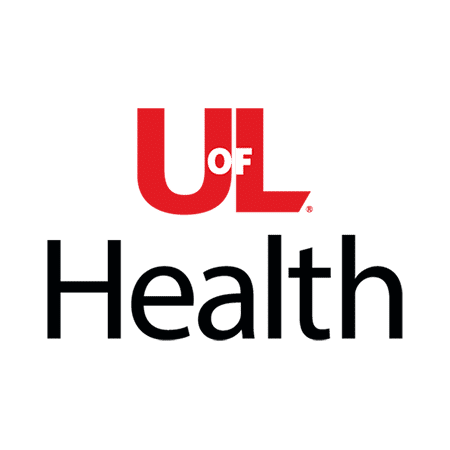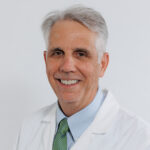For an appointment, call the Advanced Heart Failure Therapies program at 502-587-2883.
Open Heart Surgery
UofL Health – Jewish Hospital is one of the leading hospitals in the U.S. for comprehensive cardiovascular care. The site of the world's first and second AbioCor® Implantable Replacement Heart transplant, as well as the world's first successful heart transplant following the use of a Thoratec ventricular assist device. Most recently in Kentucky alone, Jewish Hospital was the first to perform open-heart surgery, heart transplant, first implantation of the HeartMate II ventricular assist device and much more.
For patients with end-stage heart failure, UofL Health offers many alternatives to heart transplantation, including the use of Ventricular Assist Devices (VAD), so if the heart can recover on its own, it can heal without the need of a transplant. Heart surgery remains an effective treatment for many conditions of the heart that cannot be corrected by medication or lifestyle changes to manage heart attack risks.
Open heart surgery is any surgery where the chest is opened and surgery is performed on the heart muscle, valves, arteries or other heart structures. The term "open" refers to the chest, not the heart itself. The heart may or may not be opened, depending on the type of surgery.
Because the heart is constantly beating, heart surgery has challenges that no other type of surgery has. Not only does it move, but it also cannot be stopped for more than a few minutes without causing brain damage.
A heart-lung machine, or a cardiopulmonary bypass machine, is usually used during conventional open-heart surgery to help provide oxygen-rich blood to the brain and other vital organs while the heart is stopped. Body cooling techniques are also used to slow the need for oxygen to the heart and allow more time for surgery without causing brain damage. This in turn enables surgeons to work on the heart for two to four hours without damaging the heart tissue.
In the instance where a heart cannot continue beating without assistance, ventricular assist devices are used as bridges to heart transplants, myocardial recovery, rescue surgeries and destination therapy, or permanent use of the device for patients that aren’t transplanted eligible.
Averaging more than 1,500 open-heart surgeries annually, UofL Health – Jewish Hospital offers the most technologically advanced, complete open-heart surgery care in the region. Why would you choose anywhere else?
Robotic & Minimally Invasive Heart Surgery
Open heart surgery is generally the most effective way to treat these cardiovascular disorders. But traditional open surgery has a number of drawbacks caused primarily by sternotomies, or the splitting of the breastbone and spreading of the ribs to access the chest cavity. In addition to an 8 to 10” scar down the center of the chest, a sternotomy leads to long recovery times.
With minimally invasive techniques, small incisions can be made between the ribs to perform coronary bypass or make repairs to the heart or esophagus by using thoracoscopy – the insertion of a miniaturized video camera between the ribs. But this approach has limitations and is not often appropriate for more complex cardiac procedures.
UofL Health offers multiple minimally invasive options for more advanced cardiothoracic procedures including, but not limited to, the da Vinci® Surgical System, the Stereotaxis GentleTouch™ Magnetic System and Transcatheter Aortic-Valve Replacement. These procedures access the heart through small incisions and avoid opening the chest cavity.
da Vinci Surgical System
The da Vinci Surgical System provides surgeons and patients with what may be the most effective, least invasive treatment option for even the most complex cardiac surgeries. The potential benefits include reduced risk of infection, less blood loss and need for blood transfusions, a shorter hospital stay, less pain and scarring and a faster recovery and return to normal activities.
Stereotaxis GentleTouch System
UofL Hospital – Jewish is also the only facility in Louisville offering groundbreaking cardiovascular procedures with the Stereotaxis GentleTouch System.
The Stereotaxis GentleTouch System allows doctors the ability to view the inside of the heart, both anatomically and electrically, through computerized catheter-based interventional procedures.
Treating complex cardiovascular procedures requires very precise digital reconstructions, or maps, of the heart. In order to create these maps, the tip of a catheter has to be accurately guided to more than a hundred different locations in a heart chamber.
Stiff manual catheters can “tent” or distort the wall of the heart. In the worst cases, the excessive force from the catheter can puncture or perforate the heart wall, a potentially lethal complication. The soft-touch of Stereotaxis’ GentleTouch catheters can reconstruct cardiac anatomy precisely without distorting the shape of the heart wall.
Physicians can perform these Stereotaxis image-guided heart procedures with precise remote instrument control, combining robotics and a 3-D mapping system to correct heart conditions more effectively.
The Stereotaxis technology provides shorter procedure times, less exposure to X-ray radiation, a reduction in contrast dyes injected into blood vessels and the reduced likelihood of referral to heart surgery.
Heart Valve Replacement
The nationally recognized UofL Health – Jewish Hospital – Heart Valve Center of Excellence is comprised of a multidisciplinary team of cardiovascular specialists dedicated to delivering advanced, minimally invasive treatments for heart valve disease. Our team consists of interventional cardiologists, cardiovascular surgeons, cardiologists, anesthesiologists, a program coordinator and a nurse navigator that work together to determine the best treatments for each patient.
Since the beginning of our program in 2011, we have accurately diagnosed and treated over 1000 patients with innovative treatments including transcatheter aortic valve replacement (TAVR). Our heart valve team has performed over 7500 heart surgeries and performs over 650 heart bypass and valve procedures annually. As an academic medical health system, our team of expert physicians and nurses often provide education, mentoring, and professional consultation to providers and hospitals nationwide.
Accurately diagnosing valvular heart disease is the key to obtaining superior results for our patients so they can return to their normal activities while improving their quality of life. At UofL Health – Jewish Hospital, patients have access to state-of-the-art diagnostic testing to include echocardiography, three-dimensional computerized tomography scan, and cardiac magnetic imaging.
Two cutting-edge treatments being provided by the Heart Valve Team are transcatheter aortic valve replacement (TAVR) and mitral valve repair through the use of a device called MitraClip.
TAVR – Transcatheter Aortic Valve Replacement
A TAVR is a minimally invasive procedure where a new valve is inserted into the heart without removing the old, damaged valve. The new valve is placed inside the diseased valve.
The UofL Health – Jewish Hospital Heart Valve Team has developed a very successful transcatheter aortic valve replacement (TAVR) program and has performed more than any other hospital in the state and region. Most TAVR procedures are “awake” procedures that provide faster recovery times and less pain for patients with severe aortic stenosis. Regardless of your level of risk for standard valve replacement surgery, you might be a candidate for this minimally invasive procedure at UofL Health – Jewish Hospital.
Why choose UofL Health – Valve Center of Excellence for your TAVR?
- Our team is comprised of board-certified cardiothoracic surgeons, interventional cardiologists, anesthesiologists, a program coordinator, and a nurse navigator all working to make sure you receive the best treatment option available.
- Many of our providers are also academic professors at the University of Louisville and regularly conduct innovative research and perform clinical trials to ensure we lead the way in establishing best care practices.
- Patients benefit from minimal sedation during their procedure, which allows for a reduced recovery time and promotes next-day discharge.
- We are organized and efficient, ensuring appointment to treatment time is prompt and reliable when time matters most.
Not everyone is a candidate for minimally invasive procedures, so please check with your doctor. To see if you are eligible for minimally invasive cardiovascular procedures, please call 1-800-333-2230.
Mitral Valve Repair – MitraClip
Mitral regurgitation occurs when the mitral valve of the heart does not close tightly, resulting in the leakage of blood backward from the heart’s left ventricle into the left atrium.
MitraClip was the world’s first transcatheter mitral valve repair therapy, providing an option for select patients with mitral regurgitation. The MitraClip Delivery System consists of implant catheters and the MitraClip device. The device is a permanent implant that attaches to the mitral valve leaflets. This procedure results in a double opening of the mitral valve that improves closure and reduces the leakiness of the valve.
Complex Surgery of the Aorta
The aorta is the main artery of the body, supplying oxygen-rich blood to the body. It starts from the left ventricle of the heart and runs down in front of the backbone. There are many conditions and diseases that can cause the aorta to dilate or tear, increasing your risk for potentially life-threatening situations. A primary cause for surgery of the aorta is when the aorta weakens and the wall abnormally bulges. The bulging is called an aortic aneurysm and can be very serious. Complex aortic procedures treat patients with aneurysms that need replacement of the aorta from the aortic valve down to the aortic bifurcation.
Advanced Heart Failure and Heart Transplantation
Advanced Heart Failure Clinic
The Advanced Heart Failure Therapies Clinic at UofL Health – Jewish Hospital diagnoses heart failure (HF) and determines the best treatment path for each patient based on their individual case. The clinic approaches patient care comprehensively, meaning we have experts in many different areas who come together to help make the process as effective and simple as possible. Team members include physicians, coordinators, nurses, pharmacists, dietitians and social workers.
Ventricular Assist Device (VAD)
A ventricular assist device (VAD) is a blood pump for those with advanced heart failure that helps the heart send blood to the rest of the body. Surgery is required to implant the VAD, which can be placed inside or outside the body.
UofL Health – Advanced Heart Failure Therapies uses VADs as:
- A bridge for patients while they wait for their heart transplant
- Permanent support for those who are not candidates for a heart transplant
- Temporary support to see if the heart will recover or heal itself before a transplant is considered
Find out more about VADs at UofL Health – Jewish Hospital
For an appointment, call the Advanced Heart Failure Therapies program at 502-587-2883.
Heart Transplant
Locations
UofL Health – Rudd Heart & Lung Center
201 Abraham Flexner Way, Suite 1001
Louisville, KY 40202
Advanced Heart Failure Therapies: 502-587-2883
UofL Health – Trager Transplant Center
220 Abraham Flexner Way, Third Floor
Louisville, KY 40202
Heart Transplant Referrals: 502-587-4384 or 1-800-866-7539


 UofL Health – Heart Hospital, A Part of Jewish Hospital
UofL Health – Heart Hospital, A Part of Jewish Hospital






